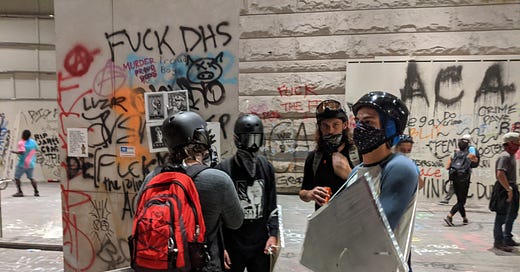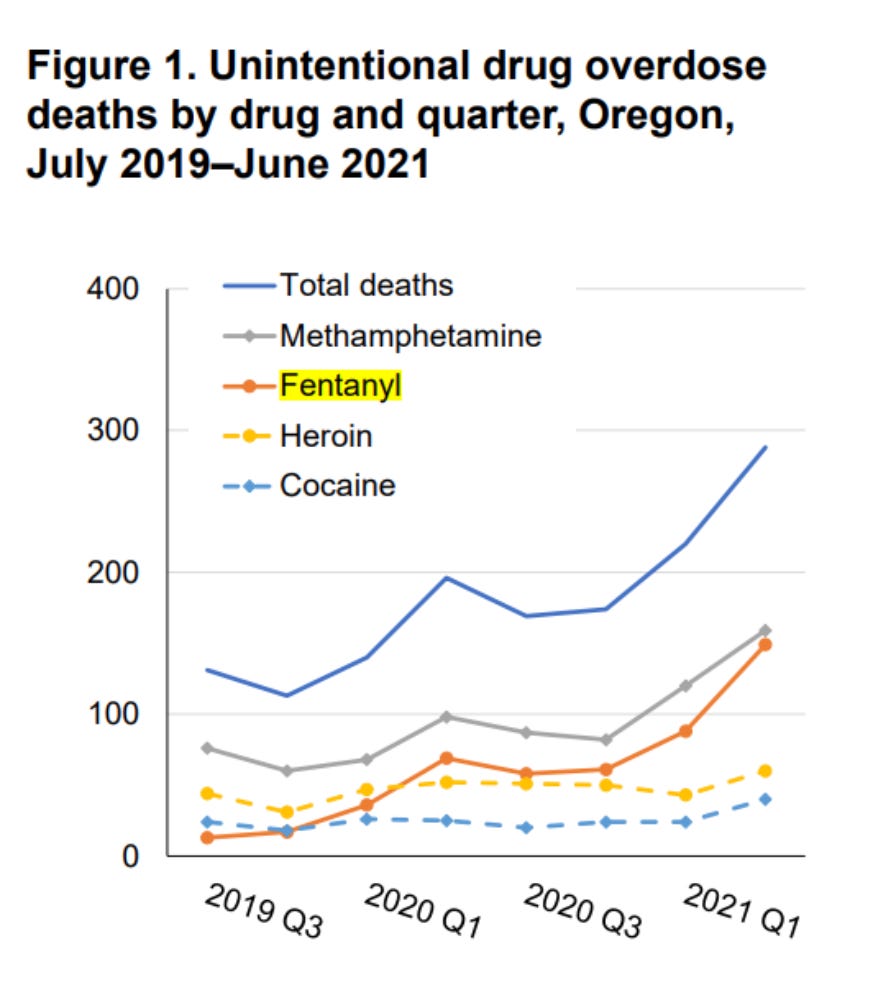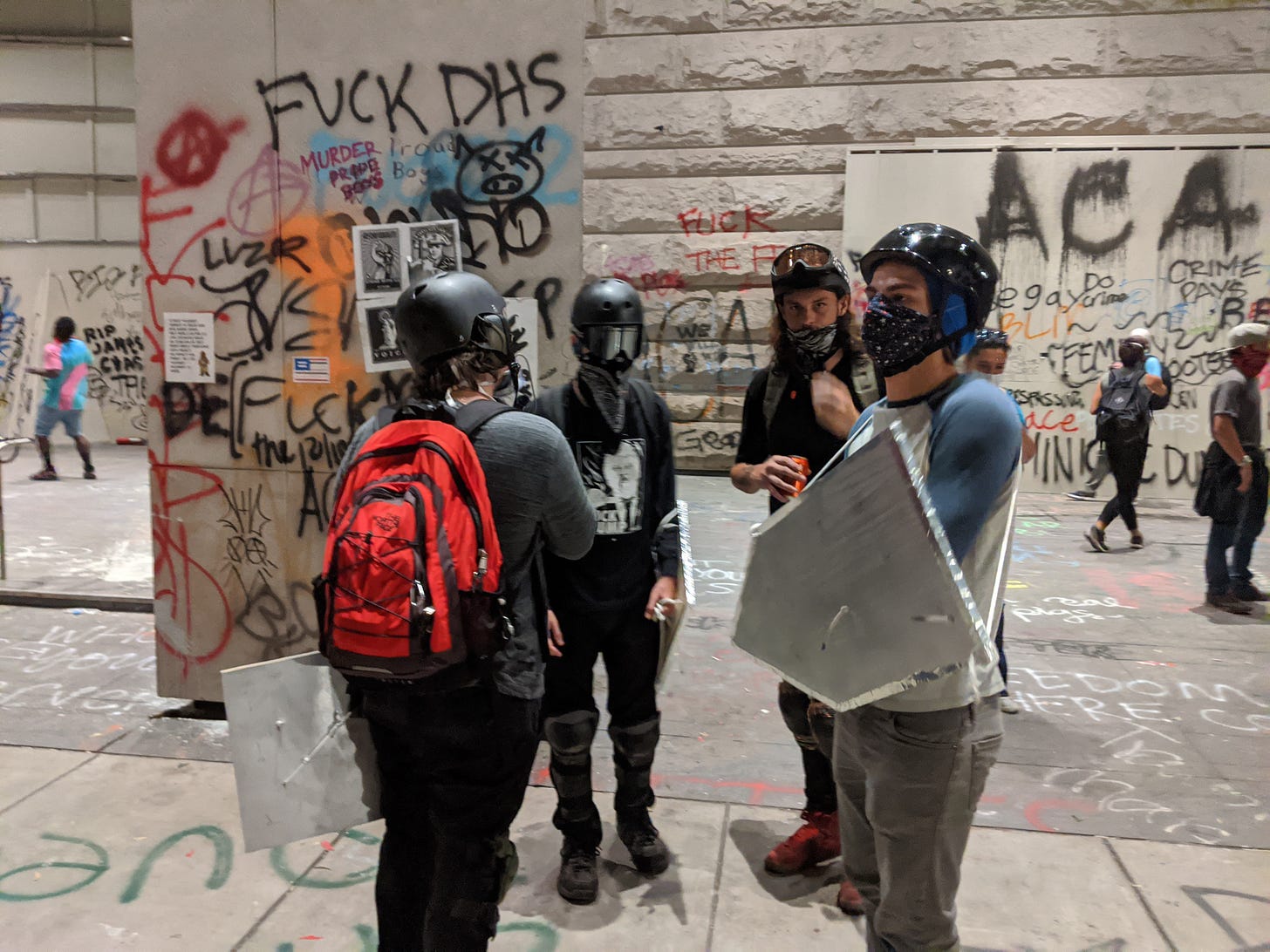Portland Was Not Ready
I commend the Times for looking at what’s going on in Portland now. Still, the distortion required to have seen protesters as full of golden promise belies a near unbelievable level of gullibility
A few weeks ago, some sort of timer went off at The New York Times, one that indicated Portland demanded attention. For the better part of this century, the city had registered with the Times, in chronological order, not at all; as good green vibe-y, as possible food mecca, as definite food mecca, as “put a bird on it!,” as “look, an actual bird!,” as reliable enemy of Donald Trump, and, by 2020, as the little guy fighting the big fight, all eyes on Portland, pressure relief valve in the aftermath of George Floyd and COVID sequestration, look at Portland go, firing salvos and ready to lead the country to a kinder and more equitable future.
That this did not happen did not receive much ink. Yes, Portland has been clumped in with other cities that have seen a spike in crime, a failure of downtowns to come back post-pandemic. But it also seemed there was a coyness to the coverage, a hesitation that comes with maybe knowing you’d bet on the wrong team. And yet this month, for editorial reasons unknown, the Times got over its hesitancies and dispatched at least three journalists and a photographer to chronicle Portland’s rise in homelessness and drug overdose deaths. The coverage has been a mixture of sadness and sobriety. “Fighting for Anthony: The Struggle to Save Portland, Oregon,” followed the life of a man who tried and failed to survive on the streets of Portland. The photo essay, “Scenes From a City That Only Hands Out Tickets for Using Fentanyl,” included a late-to-the-game astonishment in a subhead that read, “Oregon’s experiment to curb overdoses by decriminalizing small amounts of illicit drugs is in its third year, and life has changed for most everyone in the city of Portland,” and the kind of photos that are both effective and too romantic.
“From Portugal to Portland” was a clear-eyed take on how frankly stupid it was to expect Oregon’s 2020 decriminalization of street drugs to yield the sorts of benefits seen in Portugal, where decriminalization has been coupled with a five-prong support system, whereas Oregon cannot figure out how to distribute the $100 million+ earmarked for wraparound addiction services. And while I was unsurprised Opinion columnist Bret Stephens wrote about wonkery (“The Hard-Drug Decriminalization Disaster”), I was pretty stunned he opened with, “How soon is too soon to call a progressive and libertarian policy obsession a public policy fiasco?”
How about calling it two years ago, when the overdose rate were shown to have precipitously climbed? When the number of people living on the streets had, for anyone who paying attention, reached alarming rates?
Eli Saslow, previously with the Washington Post and now with the Times, covered Portland’s rising homelessness issue and the heartbreak therein in 2021, and I’ve done my share of street life coverage, most recently interviewing Lisa Schroder of the downtown restaurant Mother’s Bistro. "It's like an episode of 'Meth-Fentanyl TV' here,” she told me.
Dispatch from Portland 2023: Lisa Schroeder
Listen now (44 mins) | After sustaining “the atom bomb I needed to follow my passion” (her imminent layoff, her husband having an affair), Lisa Schroeder went to cooking school and, in 2000, opened Mother’s Bistro in Portland, Oregon. From day one the place was packed, everyone wanting what Schroder calls “Mother Food” – meatloaf and gravy, chicken & dumplings, and a brunch t…
But for much of the rest of the media, Portland has been yesterday’s news. It’s a big world and there’s no reason for a midsize city in the Northwest to be on forefront of editors’ minds in New York, or no reason other than maybe a niggling curiosity about what part they might have played in Portland’s current catastrophes. I don’t think it’s an unfair observation to note that much of the media chose not criticize and in some cases lionized mobs of young people who had neither agenda nor ability beyond busting up the courthouse, the police union hall, and any plate-glass window along the evening’s marching route, and I think it attendant of adults, and perhaps especially those in media, to ask who makes heroes of people who engage in destruction, and where will it might lead.
Keep reading with a 7-day free trial
Subscribe to Make More Pie to keep reading this post and get 7 days of free access to the full post archives.









